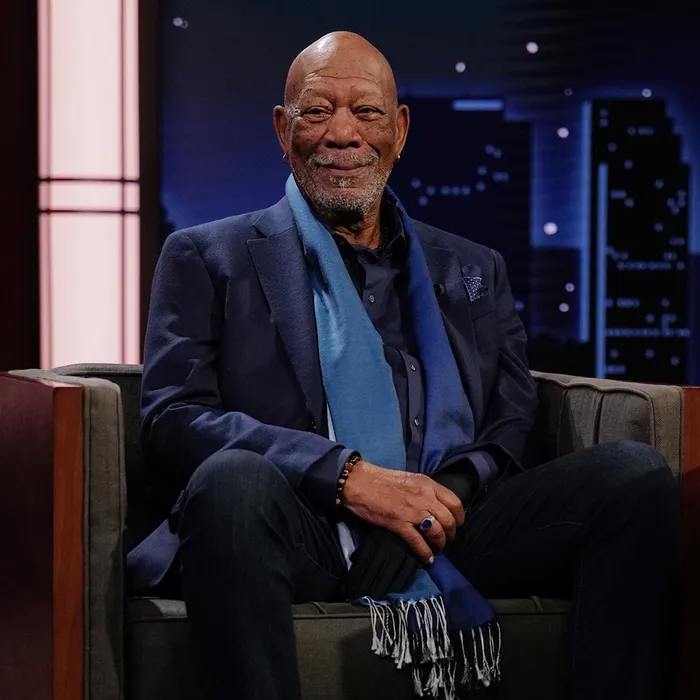Why Morgan Freeman’s fight against AI cloning matters for every artist

As AI-generated voices continue to rise in popularity, American actor Morgan Freeman remains firm in his stance against unauthorised voice cloning, calling for greater respect and consent within the entertainment industry.
Image: Facebook/Morgan Freeman
Imagine hearing Morgan Freeman’s unmistakable voice narrating something - only to discover it isn’t him, but artificial intelligence (AI).
In an age where AI is rapidly reshaping industries, Hollywood is facing its own existential dilemma: talent versus technology.
And at the centre of this growing debate is none other than the legendary actor Freeman, who has made it crystal clear that he’s not here for AI stealing his voice, likeness or livelihood.
Speaking to "The Guardian", the Oscar-winning actor revealed his frustration with AI firms cloning his unmistakable voice without his consent.
Freeman, known for his commanding presence and silky narration in films like "The Shawshank Redemption" and "March of the Penguins", didn’t mince words: “I’m like any other actor: don’t mimic me with falseness. I don’t appreciate it, and I get paid for doing stuff like that, so if you’re gonna do it without me, you’re robbing me.”
Freeman’s frustrations come amid a growing trend of AI-generated actors and voices in Hollywood.
Comedian Eline Van der Velden, who owns AI talent studio Xicoia and production company Particle6, introduced the world’s first fully synthetic “AI actor", Tilly Norwood, in September.
According to the "San Francisco Chronicle", Norwood was designed to be a completely digital performer, capable of acting in films and commercials without ever stepping onto a set.
While some view this as an innovative leap for the entertainment industry, others like Freeman see it as a direct threat to artists.
The actor’s legal team has been hard at work, tracking down companies misusing his likeness.
“My lawyers have been very, very busy,” he said, adding that they’ve already identified multiple offenders.
Hollywood's divided stance on AI
Freeman’s outspoken criticism of AI sharply contrasts with other actors who’ve embraced the technology.
Take his "Dark Knight" co-star Sir Michael Caine, for example. Earlier this year, Caine partnered with AI audio company ElevenLabs to license his voice for commercial use.
The firm’s Iconic Voice Marketplace allows brands to use celebrity voices, but only through consent-based agreements, a move that ensures actors are compensated and retain control over their likeness.
Matthew McConaughey, another Hollywood heavyweight, has also leaned into AI. The "Interstellar" star invested in ElevenLabs and has used his authorised AI voice to release a Spanish edition of his "Lyrics of Livin’" newsletter.
Even the beloved Star Wars franchise joined the trend, with Fortnite introducing an AI-generated Darth Vader voice, backed by the permission of James Earl Jones’ estate.
Freeman, however, remains unconvinced. While he acknowledges that some actors might willingly license their voices, he draws a hard line when it comes to unauthorised cloning.
“It’s not about technology replacing talent, it’s about respect and consent,” he emphasised.
The rise of AI-generated talent like Norwood raises an uncomfortable question: can technology ever truly replicate human artistry?
Freeman doesn’t think so. While AI voices might sound eerily real, he believes that they lack the depth, nuance and emotional authenticity that only a living, breathing actor can bring.
It’s not just about the voice, it’s about the soul behind it. Freeman’s voice has narrated some of the most powerful stories ever told because it carries a lifetime of experience, emotion and gravitas.
Can an algorithm replicate that?
Freeman’s battle against AI isn’t just about him; it’s about protecting the integrity of creative work.
The entertainment industry has long been built on the artistry of individuals, and AI’s rapid rise poses a fundamental challenge to that framework.
There’s also a legal and ethical dimension.
In a world where AI can clone voices, faces and even entire performances, how do we ensure that creators are compensated fairly? How do we draw the line between innovation and exploitation?
Experts in the field are already sounding the alarm.
According to a report by the World Intellectual Property Organisation (WIPO), the lack of clear regulations around AI-generated content is creating a “wild west” scenario, where creators’ rights are routinely violated.
Freeman’s fight is part of a larger push to establish boundaries and protect artists in this new digital age.
As AI continues to evolve, Hollywood faces a critical choice: embrace the technology responsibly or risk alienating the very talent that makes the industry thrive.